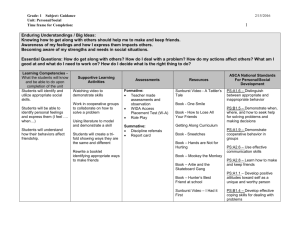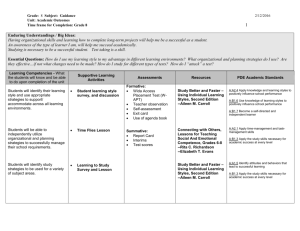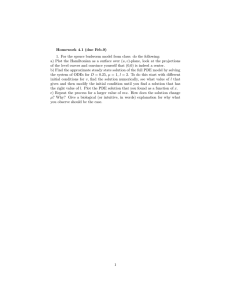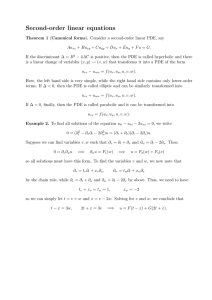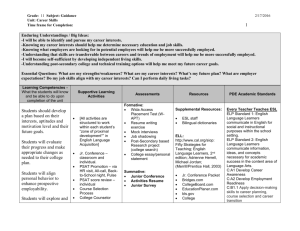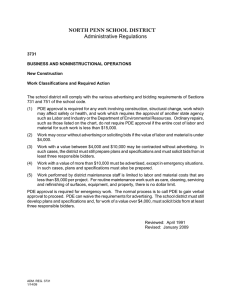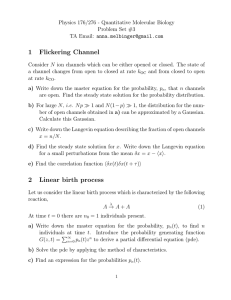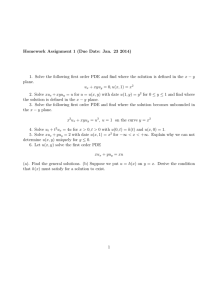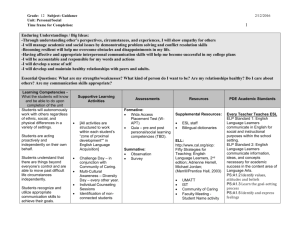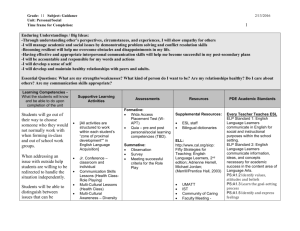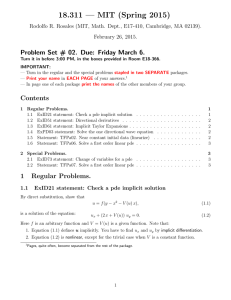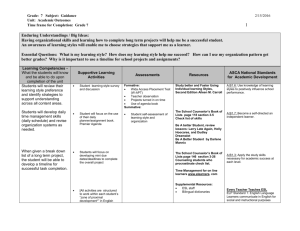Academic
advertisement
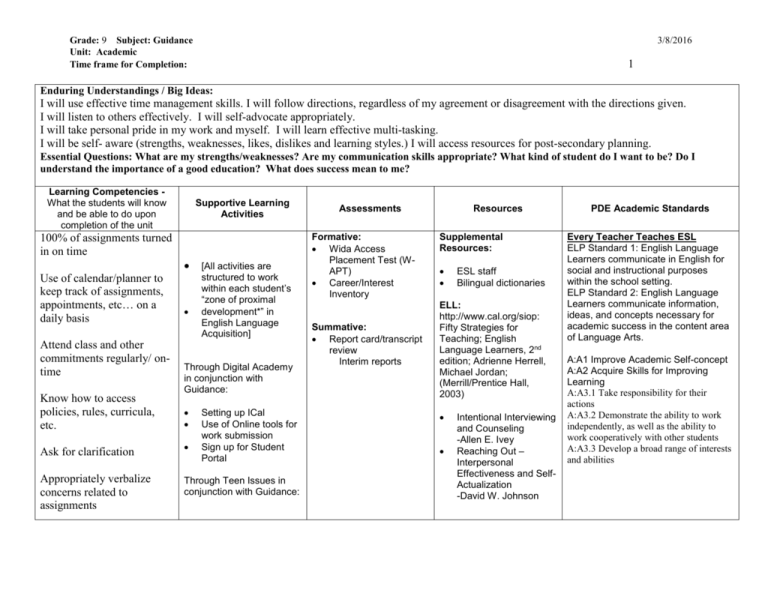
Grade: 9 Subject: Guidance Unit: Academic Time frame for Completion: 3/8/2016 1 Enduring Understandings / Big Ideas: I will use effective time management skills. I will follow directions, regardless of my agreement or disagreement with the directions given. I will listen to others effectively. I will self-advocate appropriately. I will take personal pride in my work and myself. I will learn effective multi-tasking. I will be self- aware (strengths, weaknesses, likes, dislikes and learning styles.) I will access resources for post-secondary planning. Essential Questions: What are my strengths/weaknesses? Are my communication skills appropriate? What kind of student do I want to be? Do I understand the importance of a good education? What does success mean to me? Learning Competencies What the students will know and be able to do upon completion of the unit Supportive Learning Activities 100% of assignments turned in on time Use of calendar/planner to keep track of assignments, appointments, etc… on a daily basis Attend class and other commitments regularly/ ontime Know how to access policies, rules, curricula, etc. Ask for clarification Appropriately verbalize concerns related to assignments [All activities are structured to work within each student’s “zone of proximal development*” in English Language Acquisition] Through Digital Academy in conjunction with Guidance: Setting up ICal Use of Online tools for work submission Sign up for Student Portal Through Teen Issues in conjunction with Guidance: Assessments Formative: Wida Access Placement Test (WAPT) Career/Interest Inventory Summative: Report card/transcript review Interim reports Resources Supplemental Resources: ESL staff Bilingual dictionaries ELL: http://www.cal.org/siop: Fifty Strategies for Teaching; English Language Learners, 2nd edition; Adrienne Herrell, Michael Jordan; (Merrill/Prentice Hall, 2003) Intentional Interviewing and Counseling -Allen E. Ivey Reaching Out – Interpersonal Effectiveness and SelfActualization -David W. Johnson PDE Academic Standards Every Teacher Teaches ESL ELP Standard 1: English Language Learners communicate in English for social and instructional purposes within the school setting. ELP Standard 2: English Language Learners communicate information, ideas, and concepts necessary for academic success in the content area of Language Arts. A:A1 Improve Academic Self-concept A:A2 Acquire Skills for Improving Learning A:A3.1 Take responsibility for their actions A:A3.2 Demonstrate the ability to work independently, as well as the ability to work cooperatively with other students A:A3.3 Develop a broad range of interests and abilities Grade: 9 Subject: Guidance Unit: Academic Time frame for Completion: 3/8/2016 2 Access appropriate academic support. Understand and practice active listening skills Take responsibility for materials/belongings. Written work, projects and presentations should be orderly and well defined. Pass classes with high marks regardless of interest in a specific subject area. Maintain appropriate organization in order to complete assigned tasks in all classes. Students will explore and gain practical experience to improve their understanding and grasp of the necessary skills for academic success. Communication skills Active Listening Skills Taking responsibility for your actions and behavior “I” messages “How to” utilize UMAHS supports and resources. Cross curricular study skills ASCA website Communications Lessons iHelp Support Team Gaggle.net IST A:A3.4 Demonstrate dependability, productivity and initiative A:B1 Improve Learning A:B2.2 Use assessment results in educational planning A:B2.3 Develop and implement annual plan of study to maximize academic ability and achievement A:B2.4 Apply knowledge of aptitudes and interests to goal setting A:B2.5 Use problem-solving and decision-making skills to assess progress toward educational goals A:B2.6 Understand the relationship between classroom performance and success in school A:B2.7 Identify post-secondary options consistent with interests, achievement, aptitude and abilities A:C1.1 Demonstrate the ability to balance school, studies, extracurricular activities, leisure time and family life A:C1.3 Understand the relationship between learning and work Grade: 9 Subject: Guidance Unit: Academic Time frame for Completion: 3/8/2016 3 *Zone of Proximal Development: That area between what the student is capable of at the moment and the point you want the student to reach next (Vygotsky, 1978) Stages of Second Language Acquisition: (Hill, J., Flynn, K., 2006) Stage Characteristics Approximate Time Frame Teacher Prompts Preproduction PDE: Entering The student Has minimal comprehension Does not verbalize Nods “yes” and “no” Draws and points 0-6 months Show me… Circle the… Where is…? Who has…? Early Production PDE: Beginning The student Has limited comprehension Produces one- or two-word responses Participates using key words and familiar phrases Uses present-tense verbs The student Has good comprehension Can produce simple sentences Makes grammar and pronunciation errors Frequently misunderstands jokes The Student Has excellent comprehension Makes few grammatical errors The student has a near native level of speech. 6 months to 1 year Yes/no questions Either/or questions One-or two-word answers Lists Labels 1-3 years Why…? How…? Explain… Phrase or short-sentence answers 3-5 years What would happen if…? Why do you think…? 5-7 years Decide if… Retell… Speech Emergence PDE: Developing Intermediate Fluency PDE: Expanding Advanced Fluency: PDE: Bridging
